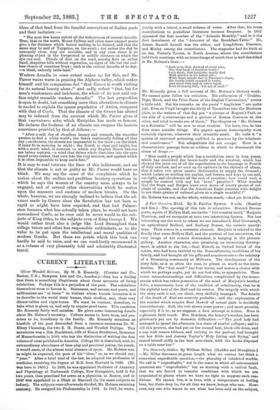CURRENT LITERATURE.
Oliver Wendell Holmes. By W. S. Kennedy. (Cassino and Co., Boston, U.S.; Sampson Low and Co, London.)—One has a feeling that there is something illegitimate about these accounts of living• celebrities. Perhaps this is a prejudice of the past. The celebrities themselves seem to favour it. Statesmen, and sevens, and poets, and millionaires are "at home" to visitors whose known intention it is to describe to the world their homes, their studies, nay, their very dinner-tables and cigar-boxes. We must be content, therefore, to take what is given us, and only to require good-taste. This condition Mr. Kennedy fairly well satisfies. He gives some interesting details about Mr. Holmes's ancestry. Culture seems to have been, and pro- mises to be, hereditary in the family. Mr. Kennedy mentions as kinsfolk of the poet descended from a common ancestress Dr. W. Ellery Channing, the two R. H. Danes, and Wendell Phillips. This ancestress was a Mrs. Bradstreet, wife of Simon Bradstreet, Governer of Massachusetts in 1689, who has the distinction of writing the first volume of verse published in America. College life is described, with its extraordinary abundance of bear-play and practical joking, the result, it would seem, of the almost total absence of sport. Mr. Holmes was, as might be expected, the poet of his "class," or, as we should say, "year." After a brief trial of the law, he adopted the profession of medicine, receiving the degree of M.D. from Harvard in 1836. (He was born in 1809.) In 1838, he was appointed Professor of Anatomy and Physiology at Dartmouth College, Now Hampshire, held it for two years, then practised for seven as a physician at Boston, and in 184/7 was appointed to a Chair at Harvard (in the same subjects as before). The subjects were afterwards divided, Mr. Holmes retaining anatomy. He resigned his Professorship in 1882. In 1827, he wrote, jointly with a friend, a small volume of verse. After that, his verse contributions to periodical literature became frequent. In 1857 appeared the first number of the "Atlantic, Monthly," and in it the first instalment of the "Autocrat of the Breakfast-Table." Mr. James Russell Lowell was the editor, and Longfellow, Emerson, and Motley among the contributors. The magazine had its birth at an inn, Porter's Tavern, in North Avenue, where the contributors held their meetings, with an interchange of mirth that is well described in Mr. Holmes's lines :—
" Snob jots, that, drained of every joke,
The very bank (.f laughter broke ; Snob deed', that Laughter nearly died
With stitches in his belted side ; While Time, caught fast in Pleasure's chain, His double goblet snapped in twain. And stood with half in either hand. Both brimming full,—but not of sand !"
Mr. Kennedy gives a full account of Mr. Holmes's literary work. We cannot quits follow his critioism. His collocation of " Crabbe,. Pope, Hood, and the Prize Poets of the English Universities," seems a little odd. But his remarks on the poets' "Anglicism " are quite just. Even as Virgil brought the Sicily of Theocritas into the Mantuan plain, so the writers of that day put "a picture of Regent's Park on one side of a stereoscope and a picture of Boston Common at the other, and tried to make one of them." The chapter on "Mr. Holmes as a Scientist" will be new to most readers. Yet here, too, he has done some notable things. His papers against homceopathy were certainly vigorous, whatever their scientific merit. He calls it "a system of universal poisoning, nullified in practice by the inliniteai- mal contrivance." But allopathists did not escape. Here is a characteristic passage from an address in which he denounced the abuse of drugs :— " How could a people which has a revolution once in four years, which has contrived the bowie-knife and the revolver, which has chewed the juice out of all the superlatives in the language in Fourth of July orations, and so used up its epithets in the rhetoric of abuse, that it takes two great quarto dictionaries to supply the demand ; which insists on sending out yachts, and horses, and boys to out-sail, out-light, and checkmate all the rest of creation ; how could such a people be content with any but hemi ' practice F What wonder that the Stars and Stripes wave over doses of ninety grains of sul- phate of quinine, and that the American Eagle screams with delight to see throe grains of calomel given at a single mouthful 7"
Mr. Holmes has not, on the whole, written much,—fiaat loth& 'Ws.


































 Previous page
Previous page